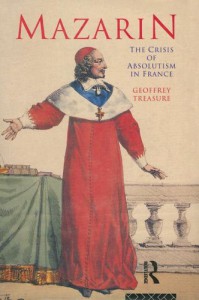A necessary stop for understanding Mazarin, but not the first one

In the mid-17th century, France emerged as the dominant power in continental Europe. While this development was the result of a range of historical factors and personages, one of the people who played a decisive role in bringing it about was the Italian-born Jules Mazarin. As chief minister of France for nearly two decades, he served as the main architect of French policy during this period, establishing the kingdom's preeminence through war and diplomacy. By the time he died in 1661 France had eclipsed Spain militarily, while the marriage Mazarin arranged between the Spanish princess Maria Theresa and the young Louis XIV helped to end France's ongoing wars with the Habsburgs and cemented its status for decades to come.
Given his achievements, Mazarin deserves a thorough biography that details his life within the context of his times. One of the things that makes Geoffrey Treasure's account of his life so impressive is that he manages simultaneously to both succeed and fall short in providing one for his readers. In it he charts Mazarin's life from his early years as a precocious young Italian nobleman through his years as a papal envoy (during which time he became a cardinal of the Roman Catholic Church) to his emergence as Richelieu's deputy and successor as chief minister. Throughout it he describes the development of Mazarin's considerable diplomatic skills, his application of them in the service of both the papacy and the French monarchy, and his broader influence on policy. While an admirer of Mazarin's, Treasure does not hesitate to identify his flaws and the errors he made in both politics and policy, which he weighs against his many accomplishments to provide a nuanced examination of his subject.
It is for these reasons that Treasure's biography is an valuable resource about Mazarin and his role in events. Yet the author's style often inhibits his efforts. His book is a dense text that assumes the reader is already well-versed in the context of 17th century French and European history, which can be problematic given the range of complex subjects he addresses, from state finances to international diplomacy. Treasure's excessively florid prose only exacerbates this problem, with some sentences so convoluted as to be indecipherable. As a result, while his book is a necessary read for anyone seeking to understand Mazarin, to fully benefit from its value it should by no means be the first one they tackle.






